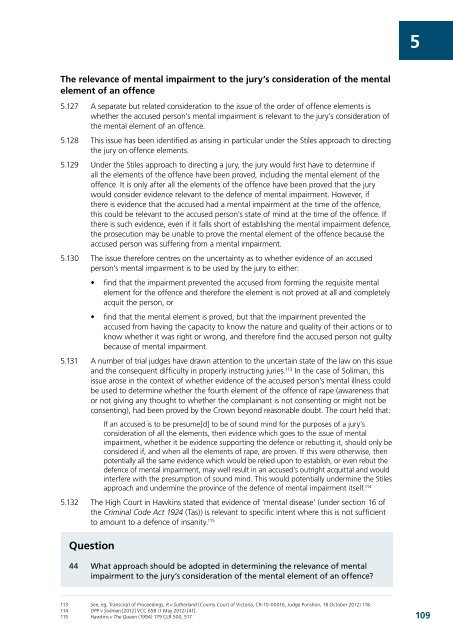Crimes Mental Impairment consultation paper.pdf - Victorian Law ...
Crimes Mental Impairment consultation paper.pdf - Victorian Law ...
Crimes Mental Impairment consultation paper.pdf - Victorian Law ...
Create successful ePaper yourself
Turn your PDF publications into a flip-book with our unique Google optimized e-Paper software.
5<br />
The relevance of mental impairment to the jury’s consideration of the mental<br />
element of an offence<br />
5.127 A separate but related consideration to the issue of the order of offence elements is<br />
whether the accused person’s mental impairment is relevant to the jury’s consideration of<br />
the mental element of an offence.<br />
5.128 This issue has been identified as arising in particular under the Stiles approach to directing<br />
the jury on offence elements.<br />
5.129 Under the Stiles approach to directing a jury, the jury would first have to determine if<br />
all the elements of the offence have been proved, including the mental element of the<br />
offence. It is only after all the elements of the offence have been proved that the jury<br />
would consider evidence relevant to the defence of mental impairment. However, if<br />
there is evidence that the accused had a mental impairment at the time of the offence,<br />
this could be relevant to the accused person’s state of mind at the time of the offence. If<br />
there is such evidence, even if it falls short of establishing the mental impairment defence,<br />
the prosecution may be unable to prove the mental element of the offence because the<br />
accused person was suffering from a mental impairment.<br />
5.130 The issue therefore centres on the uncertainty as to whether evidence of an accused<br />
person’s mental impairment is to be used by the jury to either:<br />
• find that the impairment prevented the accused from forming the requisite mental<br />
element for the offence and therefore the element is not proved at all and completely<br />
acquit the person, or<br />
• find that the mental element is proved, but that the impairment prevented the<br />
accused from having the capacity to know the nature and quality of their actions or to<br />
know whether it was right or wrong, and therefore find the accused person not guilty<br />
because of mental impairment.<br />
5.131 A number of trial judges have drawn attention to the uncertain state of the law on this issue<br />
and the consequent difficulty in properly instructing juries. 113 In the case of Soliman, this<br />
issue arose in the context of whether evidence of the accused person’s mental illness could<br />
be used to determine whether the fourth element of the offence of rape (awareness that<br />
or not giving any thought to whether the complainant is not consenting or might not be<br />
consenting), had been proved by the Crown beyond reasonable doubt. The court held that:<br />
If an accused is to be presume[d] to be of sound mind for the purposes of a jury’s<br />
consideration of all the elements, then evidence which goes to the issue of mental<br />
impairment, whether it be evidence supporting the defence or rebutting it, should only be<br />
considered if, and when all the elements of rape, are proven. If this were otherwise, then<br />
potentially all the same evidence which would be relied upon to establish, or even rebut the<br />
defence of mental impairment, may well result in an accused’s outright acquittal and would<br />
interfere with the presumption of sound mind. This would potentially undermine the Stiles<br />
approach and undermine the province of the defence of mental impairment itself. 114<br />
5.132 The High Court in Hawkins stated that evidence of ‘mental disease’ (under section 16 of<br />
the Criminal Code Act 1924 (Tas)) is relevant to specific intent where this is not sufficient<br />
to amount to a defence of insanity. 115<br />
Question<br />
44 What approach should be adopted in determining the relevance of mental<br />
impairment to the jury’s consideration of the mental element of an offence<br />
113 See, eg, Transcript of Proceedings, R v Sutherland (County Court of Victoria, CR-10-00016, Judge Punshon, 18 October 2012) 118.<br />
114 DPP v Soliman [2012] VCC 658 (1 May 2012) [41].<br />
115 Hawkins v The Queen (1994) 179 CLR 500, 517.<br />
109

















